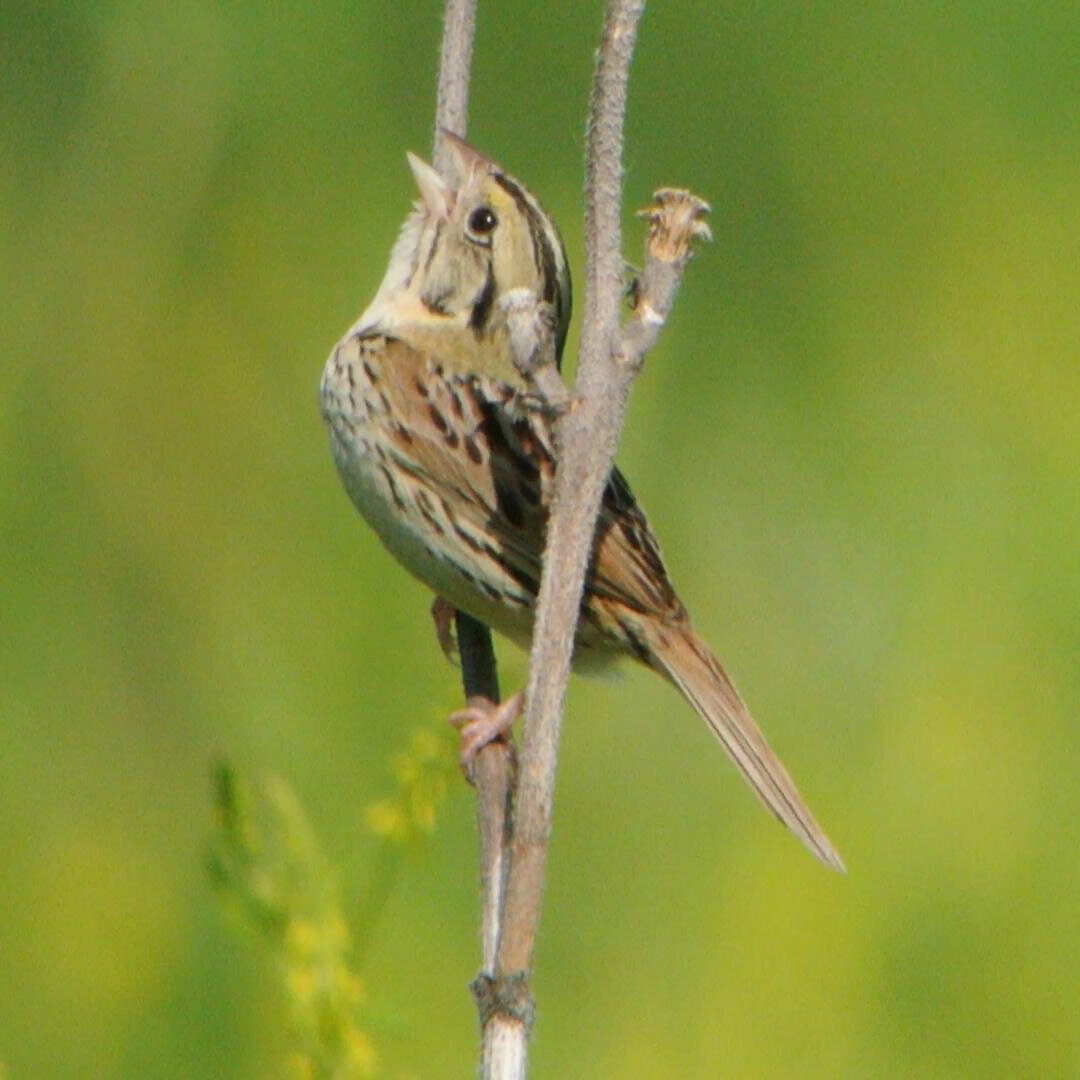The Henslow's sparrow is a small songbird with a dull brown body and a streaked breast. Endangered in seven states and threatened in Wisconsin, the Henslow's Sparrow would seem a banner bird for grassland conservation.
Photo by Arlene Koziol
Friday Feathered Feature
Showcasing a different bird species each week
The Henslow's sparrow is a small songbird with a dull brown body and a streaked breast. This bird is restricted to open habitats, typically grasslands, of the midwest and northeast. Over winter, Henslow's sparrows spend their time in longleaf pine and bog habitats of the southern US. The pairing of globally rare breeding and wintering habitat makes the bird rare across its range. Endangered in seven states and threatened in Wisconsin, the Henslow's sparrow would seem a banner bird for grassland conservation.

The inconspicuous Henslow’s sparrow, photo by Andy Reago & Chrissy McClarren
Yet, the Henslow's sparrow lacks the iconic status of the dickcissel or meadowlark. The sparrow's understated plumage and faint call—a simple tsillik—undercut its zealous heaves. David Sibley describes the call as a “feeble hiccup.” Additionally, the bird is notoriously difficult to spot. Hiding in a dense accumulation of litter a Henslow's sparrow will whistle its call, unseen. If approached, the bird often flees on foot, its brown feathers matching the dullness of a few year's foliage.
The nest resides on or near the ground, where the female incubates eggs for approximately 11 days. Chicks will occupy the nest for about 9 days, being fed a diet of grasshoppers and caterpillars.

A Faville Grove prairie may be the perfect place for a Henslow’s sparrow to nest. Madison Audubon photo
As far as managing for Henslow's habitat, the birds present an interesting dilemma. On one hand, Henslow's sparrows need two to three years of litter accumulation in order to breed in an area. Conversely, the birds tolerate a low amount of brush and need dense stands of grass for suitable habitat.
Burning will maintain the open habitat and stimulate grasses, but the sparrows dislike nesting in recently burned areas.
A patchwork of burning, like we have here at Faville Grove, can encourage Henslow's Sparrows to nest in an area. Areas with multiple years of standing dead vegetation provide cover and nesting areas for these discrete birds. Recently burned prairie provides good foraging habitat, and the dense cover of new growth can hide fledgling chicks.

A joyfully singing Henslow’s sparrow, photo by Andy Reago & Chrissy McClarren
This past week, the interns and I stumbled upon a Henslow's sparrow in the sanctuary. We first heard the calls of dozens of other birds, eventually focusing in on the Henslow's repetitive calls. Standing in a field of smooth brome, the calls seemed bromidic, or trite. As we sat there for five minutes, the bird finally emerged onto a cup plant and hoisted its unenthusiastic call our way. The bird may not be a banner for conservation, but it belts out its calls oblivious to human concerns, happily perched on a cup plant.
Written by Drew Harry, Faville Grove Sanctuary land steward

Photo by Arlene Koziol
The Henslow's sparrow is a small songbird with a dull brown body and a streaked breast. This bird is restricted to open habitats, typically grasslands, of the midwest and northeast. Over winter, these sparrows spend their time in longleaf pine and bog habitats of the southern US. The pairing of globally rare breeding and wintering habitat makes the bird rare across its range. Endangered in seven states and threatened in Wisconsin, the Henslow's sparrow would seem a banner bird for grassland conservation.
Yet, the Henslow's sparrow lacks the iconic status of the dickcissel or meadowlark. The sparrow's understated plumage and faint call—a simple tsillik—undercut its zealous heaves. David Sibley describes the call as a “feeble hiccup.” Additionally, the bird is notoriously difficult to spot. Hiding in a dense accumulation of litter a Henslow's sparrow will whistle its call, unseen. If approached, the bird often flees on foot, its brown feathers matching the dullness of a few year's foliage.
The nest resides on or near the ground, where the female incubates eggs for approximately 11 days. Chicks will occupy the nest for about 9 days, being fed a diet of grasshoppers and caterpillars.
As far as managing for Henslow's habitat, the birds present an interesting dilemma. On one hand, Henslow's sparrows need two to three years of litter accumulation in order to breed in an area. Conversely, the birds tolerate a low amount of brush and need dense stands of grass for suitable habitat.
Burning will maintain the open habitat and stimulate grasses, but the sparrows dislike nesting in recently burned areas.

Photo by Carloyn Byers. Read more about Henslow's sparrow nesting in our Into the Nest series.

Henslow's sparrow nest, drawing by Carolyn Byers. Read more about Henslow's sparrow nesting in our Into the Nest series.
A patchwork of burning, like we have here at Faville Grove, can encourage Henslow's sparrows to nest in an area. Areas with multiple years of standing dead vegetation provide cover and nesting areas for these discrete birds. Recently burned prairie provides good foraging habitat, and the dense cover of new growth can hide fledgling chicks.
This past week, the interns and I stumbled upon multiple Henslow's sparrows in the sanctuary. We first heard the calls of dozens of other birds, eventually focusing in on the Henslow's repetitive calls. Standing in a field of smooth brome, the calls seemed bromidic, or trite. As we sat there for five minutes, the bird finally emerged onto a cup plant and hoisted its unenthusiastic call our way. The bird may not be a banner for conservation, but it belts out its calls oblivious to human concerns, embedded in a mosaic of grassland habitat.
Written by Drew Harry, Faville Grove Sanctuary land steward